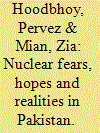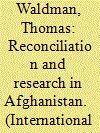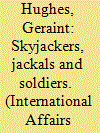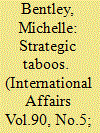|
|
|
Sort Order |
|
|
|
Items / Page
|
|
|
|
|
|
|
| Srl | Item |
| 1 |
ID:
134489


|
|
|
|
|
| Summary/Abstract |
A new round of Commonwealth reform proposals commenced at the Commonwealth Heads of Government Meeting of 2009. An ensuing report, titled A Commonwealth of the people: time for urgent reform, contained a long list of proposals that eventually resulted in 2013 in the adoption of the Commonwealth Charter. Many classic international organizations are in need of reform, but this is, of course, challenging. This new Commonwealth reform process will not lead to satisfying changes and will not make it a more relevant actor in global governance. The year 2015 marks the Commonwealth Secretariat's first half-century. We take this symbolic marker to push for a forward-looking exercise, arguing that because the true nature of the Commonwealth is often misunderstood, a better understanding of the organization is essential before embarking on any successful change-management project. In the article we identify four different kinds of Commonwealth: three of a ‘formal’ nature (the official, bureaucratic and the people's Commonwealth) and a fourth ‘informal’ one (Commonwealth Plus). By describing the potential of these four different kinds of Commonwealth, we can anticipate better the challenges with which the Commonwealth network is faced, both internal (including its mandate, its British imperial past and dominance, the organization's leadership and its membership) and external (other international organizations, other Commonwealths, rivalry with regional organizations and the rise of global policy networks). Consequently, this should lead to a better and more sustainable debate about the Commonwealth's future role in global governance.
|
|
|
|
|
|
|
|
|
|
|
|
|
|
|
|
| 2 |
ID:
134486


|
|
|
|
|
| Summary/Abstract |
A more powerful China under the seemingly confident leadership of President Xi Jinping has committed to a more activist global policy. In particular, this commitment has influenced Beijing's policy towards UN peacekeeping operations, with a long-awaited decision to add combat forces to the engineering troops and police and medical units that have been features of its past contribution. In addition, Beijing has doubled the size of its contribution to the UN peace operations budget. This article explains why the UN is a key venue for China to demonstrate its ‘responsible Great Power’ status and expressed willingness to provide global public goods. The main explanatory factors relate to the UN's institutional design, which accords special status to China even as it represents a global order that promotes the sovereign equality of states. Moreover, there are complementarities between dominant Chinese beliefs and interests, and those contained within the UN system. Especially important in this latter regard are the links that China has tried to establish between peacebuilding and development assistance with the aim of strengthening the capacity of states. China projects development support as a contribution both to humanitarian need and to the harmonization of conflict-ridden societies. The Chinese leadership has also spoken of its willingness to contribute to peacemaking through stepping up its efforts at mediation. However, such a move will require much deeper commitment than China has demonstrated in the past and runs the risk of taking China into controversial areas of policy it has hitherto worked to avoid.
|
|
|
|
|
|
|
|
|
|
|
|
|
|
|
|
| 3 |
ID:
134490


|
|
|
|
|
| Summary/Abstract |
US–Brazilian relations sunk to one of their lowest points ever following last year's exposure of the US government's massive surveillance of the South American giant—including the correspondence of President Rousseff and the business operations of Brazil's national oil company, Petrobras. Brazilian authorities responded angrily. The Brazilian president called off a highly valued state visit to Washington, denounced the US for violations of sovereignty and human rights, and proceeded to bypass the US to purchase nearly $5 billion worth of fighter aircraft from Sweden. In fact, US–Brazil ties have not been constructive for more than a generation. Yes, relations are mostly amiable, but with limited cooperation, considerable discord and some open clashes. Washington views Brazil primarily as a regional actor, and wants its cooperation mainly on inter-American issues. For Brazil, regional collaboration means working with other Latin American nations—not the United States. Brazil usually wants the US to keep a distance from the region. The US is no more enthusiastic about Brazil assuming a global role; differences over some of the world's most dangerous political and security challenges have made Washington uneasy about Brazil's engagement in international affairs and critical of its foreign policy judgements. Relations will probably improve, but they could get worse. The two governments need to acknowledge that their relationship is fragile and troubled, and take steps both to rebuild trust and to avert further deterioration and new confrontations. They have to be more careful with each other.
|
|
|
|
|
|
|
|
|
|
|
|
|
|
|
|
| 4 |
ID:
134487


|
|
|
|
|
| Summary/Abstract |
India's nuclear breakout in 1998, foreshadowed as early as 1974, may have been understandable for reasons of global nuclear politics, a triangular regional equation between China, India and Pakistan, and domestic politics. Yet the utility of India's nuclear weapons remains questionable on many grounds. Nuclear deterrence is dubious in general and especially dubious in the subcontinent. Nuclear weapons are not usable as weapons of compellence or defence. They failed to stop the Pakistani incursion in Kargil in 1999 or the terrorist attack on Mumbai in 2008. They will not help India to shape the military calculations of likely enemies. And India's global status and profile will be determined far more crucially by its economic performance than nuclear weapons. Meanwhile, they do impose direct and opportunity costs economically, risk corrosion of democratic accountability, add to global concerns about nuclear terrorism, and have not helped the cause of global nuclear non-proliferation and disarmament. Because the consequences of a limited regional war involving India could be catastrophic for the world, others have both the right and a responsibility to engage with the issue. For all these reasons, a denuclearized world that includes the destruction of India's nuclear stockpile would favourably affect the balance of India's security and other interests, national and international interests, and material interests and value goals.
|
|
|
|
|
|
|
|
|
|
|
|
|
|
|
|
| 5 |
ID:
134488


|
|
|
|
|
| Summary/Abstract |
In the four decades since Pakistan launched its nuclear weapons program, and especially in the fifteen years since the nuclear tests of 1998, a way of thinking and a related set of feelings about the bomb have taken hold among policy-makers and the public in Pakistan. These include the ideas that the bomb can ensure Pakistan's security; resolve the long-standing dispute with India over Kashmir in Pakistan's favour; help create a new national spirit; establish Pakistan as a leader among Islamic countries; and usher in a new stage in Pakistan's economic development. None of these hopes has come to pass, and in many ways Pakistan is much worse off than before it went nuclear. Yet the feelings about the bomb remain strong and it is these feelings that will have to be examined critically and be set aside if Pakistan is to move towards nuclear restraint and nuclear disarmament. This will require a measure of stability in a country beset by multiple insurgencies, the emergence of a peace movement able to launch a national debate on foreign policy and nuclear weapons, and greater international concern regarding the outcomes of nuclear arms racing in South Asia.
|
|
|
|
|
|
|
|
|
|
|
|
|
|
|
|
| 6 |
ID:
134485


|
|
|
|
|
| Summary/Abstract |
Why has Piketty's Capital become a publishing sensation? Not for revolutionary findings; its message that western societies have experienced increases in inequality of income and wealth over the long term is hardly new. Of the several reasons discussed in this article, attention is paid in particular to the book's timing and its claim to reveal the laws of income and wealth distribution in western societies. Had the book been published before 2008 it would have been much less successful. Piketty's revelation of the big trends and their underlying logic helps to objectify, legitimize and offer a kind of catharsis for surging middle-class anxieties during the Great Recession. These anxieties have been further intensified by evidence that over 90 per cent of the increase in disposable income in the United States has accrued to the top 1 per cent of the population in the past several years, and a not much lower percentage to the top 1 per cent in Britain. In the conclusion it is argued that if Piketty's forecasts are even remotely accurate, capitalism will lose its core claim to legitimacy.
|
|
|
|
|
|
|
|
|
|
|
|
|
|
|
|
| 7 |
ID:
134484


|
|
|
|
|
| Summary/Abstract |
This article examines the evolution of western policy towards the idea of pursuing negotiations with the Taliban, or ‘reconciliation’, in Afghanistan and the role that research and expert opinion played in that process. The official western position has evolved iteratively from initial rejection to near complete embrace of exploring the potential for talks. It is widely assumed that the deteriorating security situation was the sole determinant of this major policy reversal, persuading decision-makers to rethink what had once been deemed unthinkable. Moreover, given the politicized and sensitive nature of the subject, we might expect the potential for outside opinion to influence decision-makers to be low. Nevertheless, this article demonstrates that it would be a mistake to underestimate the role that research and expert knowledge played—the story is more nuanced and complex. Research coalesced, sometimes prominently, with other key drivers to spur and shape policy change. Importantly, it often took experts to make sense of events on the ground, especially where the failure of the military approach was not recognized, understood or palatable to those in official circles. Research interacted with changing events, policy windows, the emergence of new personalities and the actions of various intermediaries to shape emerging positions. More broadly, the case of reconciliation in Afghanistan reveals the difficulties and challenges, but also the variety of opportunities and techniques, for achieving research influence in conflict-affected environments.
|
|
|
|
|
|
|
|
|
|
|
|
|
|
|
|
| 8 |
ID:
134482


|
|
|
|
|
| Summary/Abstract |
Following the Munich Olympics massacre of September 1972, the British government conducted a series of contingency plans to ensure that Whitehall, police constabularies and the armed forces were prepared for similar crises affecting the UK and its citizens. This article examines the evolution of British counterterrorist planning during the 1970s, which still shapes Whitehall's crisis management procedures for responding to international terrorism, and also procedures for calling for military support in response to hijackings, hostage-taking and similar incidents both domestically and overseas. It demonstrates that while there are differences in the character of the terrorist threat 40 years ago and today, there are also parallels between the practical and political challenges of counterterrorism in the era of the Baader–Meinhof group and Carlos the Jackal, and the struggle against al-Qaeda and its affiliates today.
|
|
|
|
|
|
|
|
|
|
|
|
|
|
|
|
| 9 |
ID:
134483


|
|
|
|
|
| Summary/Abstract |
This article examines US President Barack Obama's foreign policy rhetoric on Syria, specifically in relation to the threat of chemical weapons and the prohibitionary taboo surrounding their use. It contends that Obama's rhetorical construction of the taboo is not simply a commitment to the control of these horrific weapons (where such arms have been comprehended as so extensively vile as to preclude their employment), but that this also represents the strategic linguistic exploitation of these normative ideals in order to directly shape policy. By analysing of presidential speeches made during the conflict, it demonstrates that Obama has manipulated pre-existing conceptions of chemical weapons as taboo, and also as forms of weapons of mass destruction, to deliberately construct policy in line with his own political ambitions—most notably as a way of forcing a multilateral solution to the situation in Syria. This article challenges existing perceptions of the chemical weapons taboo as an inherently normative constraint, arguing that this instead comprises a more agency-driven construct. Static notions of the taboo must be abandoned and subsequently replaced with a framework of understanding that recognizes how the taboo can be used as a deliberate driver of foreign policy.
|
|
|
|
|
|
|
|
|
|
|
|
|
|
|
|
|
|
|
|
|